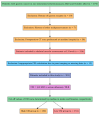Low Preoperative Cachexia Index Is Associated with Severe Postoperative Morbidity in Patients Undergoing Gastrectomy for Gastric Cancer
- PMID: 41008656
- PMCID: PMC12469034
- DOI: 10.3390/diagnostics15182284
Low Preoperative Cachexia Index Is Associated with Severe Postoperative Morbidity in Patients Undergoing Gastrectomy for Gastric Cancer
Abstract
Background/Objective: Cancer cachexia is a multifactorial syndrome that contributes to adverse surgical outcomes in gastric cancer (GC), yet weight-based criteria often fail to detect subclinical cases. This study aimed to assess the prognostic utility of the Cancer Cachexia Index (CXI) in predicting severe postoperative complications after curative gastrectomy. Methods: We retrospectively analyzed 301 patients with GC who underwent curative surgery between January 2020 and October 2023. CXI was calculated as L3 skeletal muscle index × serum albumin/neutrophil-to-lymphocyte ratio (NLR), and patients were stratified into low- and high-CXI groups based on sex-specific medians. Postoperative complications were classified using Clavien-Dindo, with grade ≥ III considered major morbidity. Group comparisons included rates of major complications and hospital stay. Results: The low-CXI group had significantly lower muscle mass and albumin levels, higher inflammatory markers, and more T4 tumors. Major complications occurred more frequently in this group (p < 0.001). In multivariate logistic regression, low CXI independently predicted severe complications (OR: 2.89; 95% CI: 1.42-5.85; p = 0.003), alongside older age and smoking. Receiver operating characteristic (ROC) analysis showed a CXI cut-off of 34.75 yielded high specificity (94.86%) for predicting major morbidity. Conclusions: Preoperative CXI is an effective predictor of severe postoperative morbidity in GC patients, outperforming traditional nutritional and inflammatory markers. Incorporation of CXI into routine preoperative assessment may enhance surgical risk stratification and guide perioperative optimization.
Keywords: Cancer Cachexia Index; Clavien–Dindo; gastric cancer; inflammation; postoperative complications; skeletal muscle.
Conflict of interest statement
The authors declare no conflicts of interest.
Figures



References
-
- Sasahara M., Kanda M., Ito S., Mochizuki Y., Teramoto H., Ishigure K., Murai T., Asada T., Ishiyama A., Matsushita H., et al. The Preoperative Prognostic Nutritional Index Predicts Short-Term and Long-Term Outcomes of Patients with Stage II/III Gastric Cancer: Analysis of a Multi-Institution Dataset. Dig. Surg. 2020;37:135–144. doi: 10.1159/000497454. - DOI - PubMed
-
- Voeten D.M., van der Werf L.R., Gisbertz S.S., Ruurda J.P., Henegouwen M.I.v.B., van Hillegersberg R., van Det M.J., van Duijvendijk P., van Esser S., van Etten B., et al. Postoperative intensive care unit stay after minimally invasive esophagectomy shows large hospital variation. Results from the Dutch Upper Gastrointestinal Cancer Audit. Eur. J. Surg. Oncol. 2021;47:1961–1968. doi: 10.1016/j.ejso.2021.01.005. - DOI - PubMed
-
- Yoon J.Y., Shah S.C., Lin J.J., Kim M.K., Itzkowitz S.H., Wang C.P. Shattering the monolith: Burden of gastrointestinal cancer in Asian Americans, Native Hawaiians, and Pacific Islanders in the United States. Lancet Reg. Health Am. 2024;41:100954. doi: 10.1016/j.lana.2024.100954. - DOI - PMC - PubMed
LinkOut - more resources
Full Text Sources
Miscellaneous

